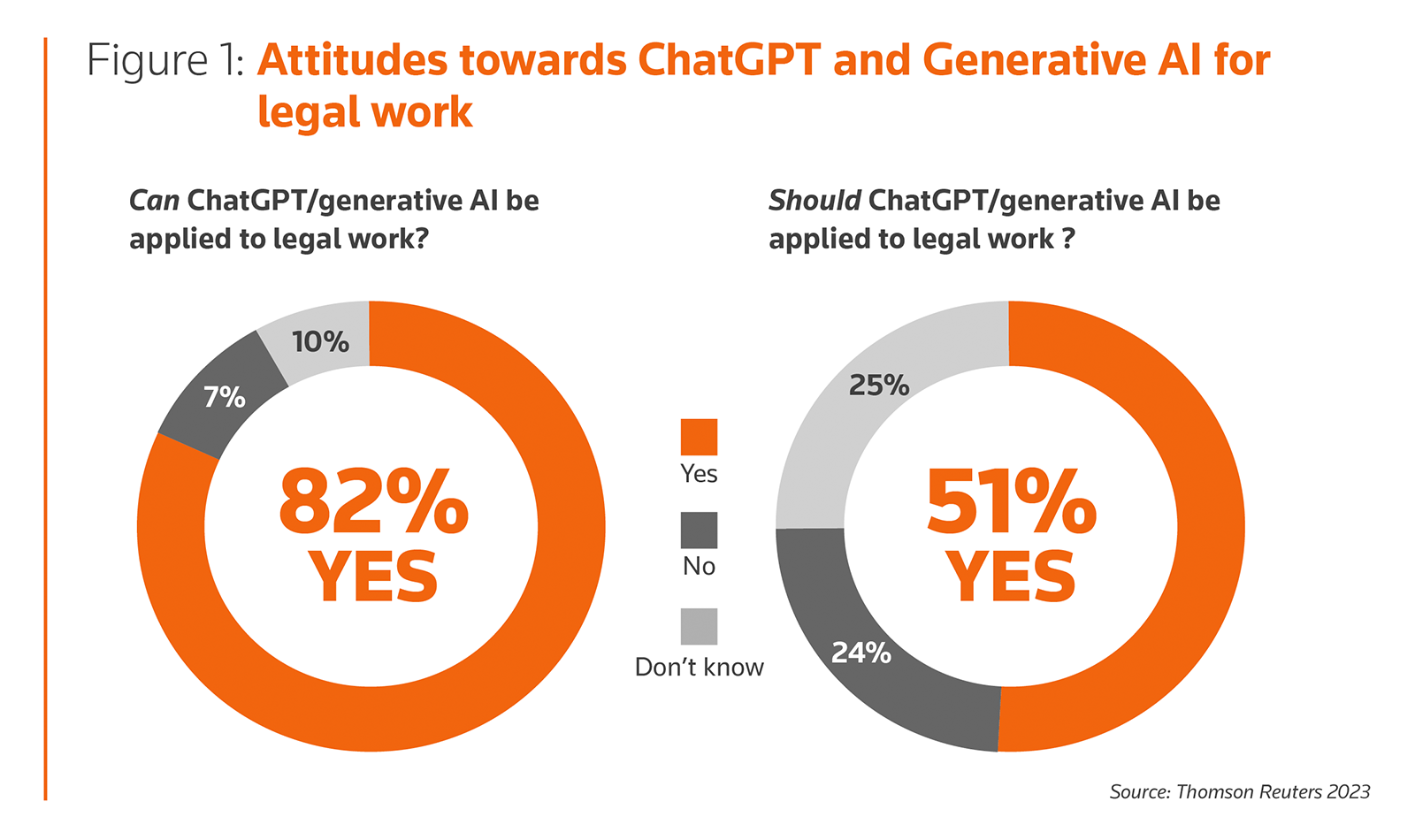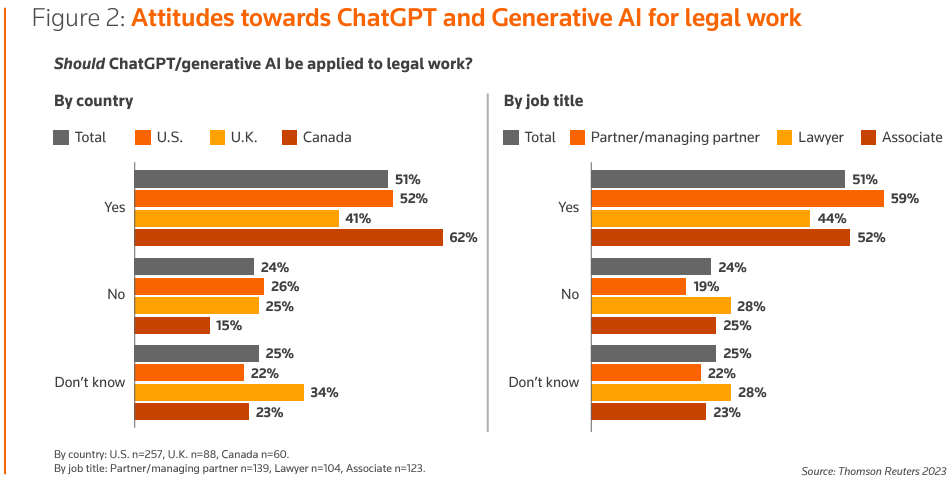Law firms of all sizes have an opportunity to adjust the way they work with generative AI.
Generative AI can help all legal professionals stretch their ideas of what technology can do and create important growth opportunities.
Jump to:
| What is generative AI? |
| How is AI impacting law firms? |
|
|
Sole practitioners use generative AI to grow |
| Small law firms innovate through generative AI |
| Mid-size law firms use generative AI to compete on a new level |
| Global large law firms match client needs with generative AI |
| Conclusion |
What is generative AI?
Generative AI is a type of machine learning that creates drafts of content like documents, images, and songs in response to prompts from the user. ChatGPT from OpenAI is one of the best-known generative AI tools, though several other offerings have become widely available. These tools comb through large volumes of content to create “the best” response to the prompt.
“Generative AI is smart enough to give a plausible answer to most prompts,” says Zach Warren, who leads Technology and Innovation Content for the Thomson Reuters Institute.
“From there, the human using the tool should decide whether the material is accurate and edits it. It can be a great way to get a solid first draft, even for legal issues.”
Many legal professionals are already considering the use of generative AI in their legal practice. In a recent survey, the Thomson Reuters Institute found that 82% of legal professionals believe that the capability can be used in legal work. Only 51% believed that it should be used in legal work. The difference suggests that legal professionals see the potential but are unsure if they can trust the available tools to deliver accurate legal work product.
Warren offers several ways lawyers can use generative AI to create efficiencies in their practice. For instance, you can ask the tool to write a brief or contract based on a set of facts. Once the tool generates a draft, you check the citations, terms, and narrative, editing the draft rather than starting from scratch. You can also use generative AI tools to draft an RFP response to lighten the load in business development.
Generative AI also has the potential to synthesise large amounts of data. For instance, you can upload four contracts to an AI tool and ask to see the similarities and differences or review bulk volumes of contracts quickly. You can analyse spreadsheets full of data or get plain language answers to legal questions.
How is AI impacting law firms?
Generative AI is poised to create incredible efficiencies and cut down on the number of hours that lawyers work. Warren says that with a trusted tool, a legal professional may be able to cut down a task such a brief writing from ten hours to even one hour.
“That means the differentiating factor for lawyers won’t be time. It will be how well people manage their cases,” says Warren.
Law firms will all need to leverage their efficiency gains and still bill for the value they provide. This dynamic plays out differently depending on firm size. Sole practitioners and smaller firms will find that their innovative use of generative AI enables them to take on matters they couldn’t before. Larger firms will find that their clients expect them to use generative AI, and they will need to adapt processes and pricing to properly capture value.
Let’s look at the impact of generative AI on law firms, depending on their size.
Sole practitioners use generative AI to grow
Generative AI can be a powerful helper for sole practitioners looking to grow their practice. For those billing by the hour, growth is limited by the number of hours in a day. Even those who price by the matter are limited by their own ability to get through the work in a reasonable time frame. With AI-powered legal research and know-how from a trusted source, you can cut significant time from both transactional and litigation matters.
“This is pure time savings,” Warren says. “You’re not giving different advice, but maybe you can take on more clients or do more work.”
You may be more available to take client calls or meet with them when you are spending less time researching and drafting. You may also be in a better position to offer fixed-fee pricing, which clients may appreciate.
Rather than using the extra time to take on more work, some lawyers may use generative AI to deliver the same amount of work in less time. That allows them to spend more time with family or on their own professional development. Either way, if you’re spending less time on tasks like research or form submissions, you have more time to spend how you want to spend it.
Small law firms innovate through generative AI
Small law firms – those with up to 10 lawyers – also benefit from the time savings that their solo counterparts experience. They can take on more matters with their lean teams, and they can explore new practice areas more easily, especially with AI-powered know-how tools.
Small law firms that adopt generative AI early are likely to be seen as innovative and forward-thinking. Rather than waiting for the market to settle on uses for generative AI, early adopters can experiment based on the needs of the firm or the interests of the lawyers.
“Small law firms have so much flexibility to experiment and implement new tools,” Warren says. “If you have individuals who are taking the time to learn this, you’ll find there are so many more ways to use the tools.”
Where larger firms may wait on committees or consultants to approve an AI approach, smaller firms can move quickly to take advantage of the capabilities.
Small firms may also benefit more immediately because they can get even more from their newly qualified solicitors.
“Training and getting people out of law school is going to be interesting,” Warren says. “Documents, legal research, and writing contracts are tasks that can be streamlined or automated or simplified with generative AI, and they are also tasks that most often fall to newer associates. Firms that use generative AI will be able to move new associates to more strategic work more quickly.”
This is a selling point for clients, who don’t want to pay to train junior lawyers. It’s also a differentiator in hiring. Small law firms can compete better in the war for talent if they can promise less grunt work and more opportunities to work directly with partners and clients.
“Generative AI can be a huge boon to associates looking to accelerate their career,” Warren says.
Mid-sized law firms use generative AI to compete on a new level
Warren says that on the whole, AI can be seen as an equalizer for both small and mid-sized firms. “You’re competing with enterprise firms that can just throw people at a problem,” he says. Generative AI like Chat GPT, Copilot, and legal-specific tools can act as a force multiplier for smaller firms that don’t have armies of new associates.
Partners are particularly aware of this dynamic. In fact, in the Thomson Reuters Institute study, “ChatGPT & Generative AI within Law Firms,” partners were the most likely to respond that generative AI should be used in legal work, outpacing the total 59% to 51%. “If you’ve made partner, you’re thinking strategically about cases and about what’s right for the firm and the business,” Warren says. “You’re aware of the efficiencies the tools bring, of the way those efficiencies could lower costs or boost growth.” For a lawyer eager to make a name for themselves in the firm, helping the firm learn and implement AI could be an important career booster.
“This is the time for firms to empower people who are curious,” Warren says. “Right now, the interest in generative AI is high but adoption is low. Being the person who jumpstarts the AI initiative in your firm can be very powerful for career development.”
Aspiring AI experts can look at AI-powered document review tools, know-how, and legal research platforms as possible new tools for the firm.
Global large law firms match client needs with generative AI
“Generative AI represents a shift in how global large law firms approach their business,” says Warren. That could mean that they’ll see more client pressure to go to fixed-fee pricing. Or that corporate clients could decide to keep more matters in-house. “Clients want big firms to use technology. They also don’t want to pay firms to handle things they can do themselves.”
Warren identifies this as a particular issue for the global large law firms, versus smaller firms, because their clients tend to be the largest corporations. They have large legal teams themselves, and they are keen to manage costs as closely as possible. They are automating their processes, and they expect their law firms to do the same.
“Small companies may appreciate you using generative AI,” Warren says, “But large companies will expect it.”
Global large law firms will have to navigate through the same disruptive dynamics that small and mid-sized firms do but on a greater scale. You will have to continually look at pricing models to be sure you’re capturing the value of your work product. You’ll have to look at how you onboard newly qualified solicitors, what work you have them cut their teeth on, and how you mentor them through the early years of their practice.
Firms may find that generative AI changes much about their businesses. Not because it replaces lawyers, but because it disrupts the status quo around the billable hour, overworked lawyers, tedious work, and impossible goals so completely. It can’t replace expertise, but a combination of best-in-class AI-powered technology could significantly reshape the way global large law firms and their clients do business together.
Conclusion
Generative AI is here and it’s advancing all the time, so lawyers and law firms need to understand the impacts it can have on their practice.
“Generative AI will affect all lawyers, no matter which size firm you work for,” Warren says. He urges legal practitioners to start exploring the capabilities now. And to understand how different platforms verify their results. Don’t use something you can’t trust,” he says.
Those firms that lean into the capabilities can start to realise significant time savings and perhaps shift their approach to pricing, employee training, and retention to reduce costs and grow revenue. Sole practitioners can take on more matters without working more hours – or they can spend less time working while maintaining their income. Small and mid-sized firms can compete with larger firms, either by taking on more matters or by expanding their practice areas. Global large law firms will use generative AI to keep up with their corporate clients and offer greater value in less time.
Generative AI is only as good as its source material. See how Thomson Reuters is providing trusted answers through AI.





